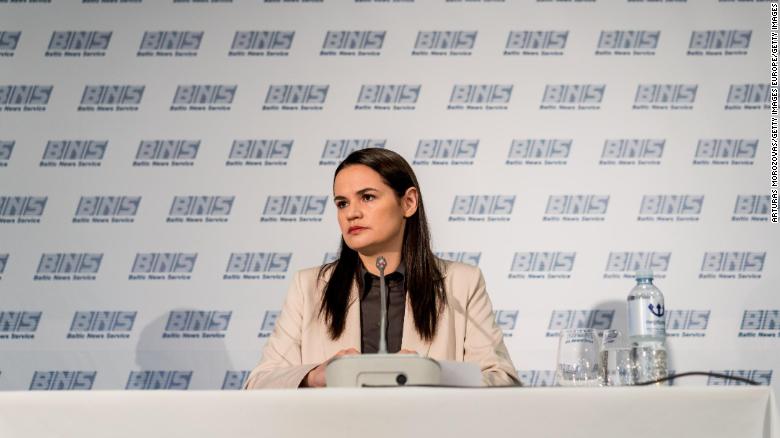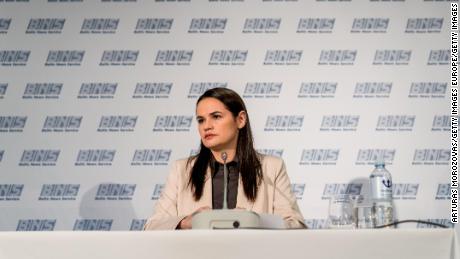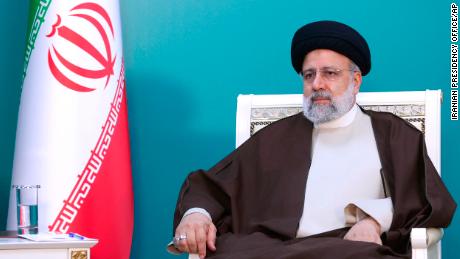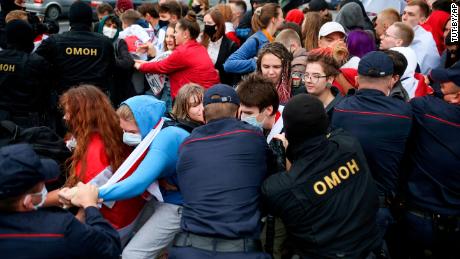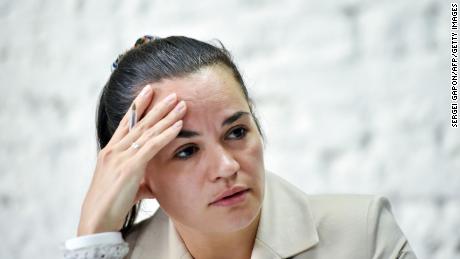(CNN)Belarusian President Alexander Lukashenko visited Sochi in southwest Russia on Monday for one-on-one talks with Russian President Vladimir Putin, seeking reassurances of Russia's support after weeks of protests in Belarus.
Tens of thousands of protesters have taken to the street every weekend since Lukashenko declared victory in the presidential election on August 9, demanding new elections. Opposition figures have publicly accused Lukashenko of rigging the vote and have since disappeared from the country.
Some are living in exile due to fears for their personal safety. Maria Kolesnikova, one of the three women who stood against Lukashenko, was detained at the Belarusian border last week after what her representatives said was an attempt by the authorities to forcibly deport her. She has since been in custody in a detention center near Minsk, her press secretary previously told CNN.
In televised remarks on Monday, Lukashenko said that "recent events showed us that we need to stay close to our big brother and cooperate more closely on all matters, including economic ones."
In the meeting, Putin reiterated that Russia has agreed to provide Belarus a loan in the region of $1.5 billion. The two presidents also discussed the "Slavic Brotherhood" joint military drills that kicked off today in Belarus, with Putin saying Russian units will return home after the training.
Prior to the meeting, analysts had expected that Monday would result in some kind of agreement that keeps Lukashenko in place, at least for now. However, it's still unclear whether that agreement will ultimately lead to a transition of power, brokered by Russia, or to a more full-throated support for Lukashenko.
And by merely sticking to his previous commitments on Monday, Putin has shed little light on his long-term plan for Belarus.
"For Russia, the key concerns remain as they were at the outset of this crisis: Not losing Belarus to the West, not allowing an unstable or unpredictable situation in a neighboring country, and not allowing people power to force a change in leadership," said Keir Giles, a senior consulting fellow on the Russia and Eurasia Programme at Chatham House.
He added that Putin has options to prevent this from happening, including "covert or overt support for Lukashenko, greater integration ... or in the worst case, managing an orderly transition of power to someone less prickly for Moscow to deal with than Lukashenko."
The pair's relationship has been prickly over the past two decades for a variety of reasons. In the 2000s, Lukashenko tried to distance himself from Russia in an attempt to ditch his strongman image. They have also argued over gas prices, with Lukashenko repeatedly complaining about the high prices offered by Russia in recent years. Putin has maintained his government is not going to offer any discounts before Belarus agrees for a deeper union integration with Russia, a project unpopular among Belarusians.
However, Lukashenko is a known quantity to Russia. And Putin historically is no fan of regime change in countries living under dictatorship.
"Moscow not only prefers to keep its friends in power in autocratic regimes, but also more broadly prefers stability and predictability to sudden changes in geopolitics," said Giles. He adds that this could be down to two of Putin's most acute concerns: "The fantasy that this is all part of an ongoing Western campaign to overthrow regimes and its eventual target is Moscow; and the reality that when leaders whom the West dislikes are overthrown, as with Saddam Hussein and Muammar Gaddafi, they have a tendency to be lynched."
For Lukashenko, the inherent weakness of his position means that he may need to exchange ceding greater control of Belarus to Putin in exchange for Russian support that keeps him in power.
"Lukashenko is going to Russia while he has some political space," said Franak Viacorka, non-resident fellow at the Atlantic Council and journalist based in Belarus. "He has removed the opposition's institutional instruments that could remove him from power, at least for the time being. So, even though he is visiting Putin knowing how weak he is, he is also able to demonstrate that he is still ultimately in control of the security forces and government."
All of which means that both leaders may have reached a temporary agreement through gritted teeth, as Putin concedes that Lukashenko is his least-worst option for now, while Lukashenko does what it takes to remain in control of his country.
